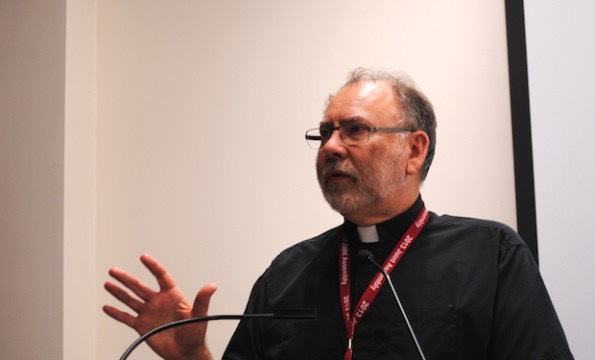
KTFnews.com Pastor Hal Mayer
After 500 years of separation and after many attempts by the Catholic Church to bring the Lutherans back into Rome, including a 30-year war, the establishment of the Jesuits, whose mission is to “undo all the Protestantism has done” (See The Great Controversy pages 565, 566), and other tactics, the Roman Catholic and Lutheran churches are now contemplating taking communion together.
The Council of the General Synod and the Evangelical Lutheran Church in Canada (ELCIC) discussed the commemoration in 2017 of the 500th anniversary of the Reformation on November 14. They had taken an extremely important step the previous month. On October 30 in jointly issuing a document entitled Declaration on the way: Church, Ministry and Eucharist, they called for the Pontifical Council for Promoting Christian Unity (PCPCU) and the Lutheran World Federation (LWF) to “create a process and timetable to address outstanding issues” between them. They are also seeking more opportunities to take communion together.
Non-Roman Catholics are occasionally, though rarely, given communion by Catholic priests in certain circumstances. “If that comes to fruition, we’ve reached a major, major milestone…”
The increasing rapprochement between Lutherans and Catholics in recent years has symbolically encouraged the leaders of both sides. The release of Declaration on the Way is one sign. Another is a recent tweet by Pope Francis on Martin Luther’s birthday, November 10 in which he used the Latin phrase “semper reformanda”—a clear allusion to the early Lutheran rallying cry, “Ecclesia semper reformanda est,” meaning “the church must always be reformed.” The tweet warmed the hearts of Lutheran ecumenists.
Another sign that rapprochement is near is the fact that Lutherans and Roman Catholics are labelling the events planned for 2017 as a “commemoration” of the beginning of the Reformation, not a “celebration.” This is a choice of words that places guilt on the Lutherans for being loyal to the Bible.
“It delighted me enormously…to hear the Holy Father use the words,” said the Rev André Lavergne, assistant to the bishop, ecumenical and interfaith at ELCIC. “That was not an accident—there are no such accidents,” he added with a smile.
Another anniversary in 2017 will mark the beginning of the ecumenical dialogue between the Roman Catholic and Lutheran churches, which started in the 1960s after the Second Vatican Council that initiated the ecumenical movement. The ecumenical movement is described as a “new spirit” that swept through the Catholic Church and led it to “open its windows and its doors to a world beyond itself, and invite conversation.”
The ELCIC commemoration “is very much built on the ecumenical dialogue proffered by the Vatican,” Lavergne said.
The discussion also centered around the landmark Joint Declaration on the Doctrine of Justification (JDDI), a key foundation agreement in Roman Catholic – Lutheran ecumenical dialogue and understanding released in 1999. The document declares that Catholics and Lutherans have reached consensus on the basic ideas around the doctrine of Justification, which was at the center of the separation at the Reformation. Previously, the World Methodist Council had adopted the theological statement, and the Anglican Consultative Council is contemplating a similar gesture, which it will discuss at its meeting in Lusaka, Zambia in 2016.
“Who knows what tomorrow will bring, in a place where 500 years after the Reformation, Lutherans and Catholics are talking about communion together?” said Lavergne.
Students of prophecy know what tomorrow will bring. They know that there will be unity between all churches and faiths on the basic tenets of Roman Catholicism as all will unite with her against God and against His true followers who keep all of His commandments, including the seventh-day Sabbath.
“The Roman Church now presents a fair front to the world, covering with apologies her record of horrible cruelties. She has clothed herself in Christlike garments; but she is unchanged. Every principle of the papacy that existed in past ages exists today. The doctrines devised in the darkest ages are still held. Let none deceive themselves. The papacy that Protestants are now so ready to honor is the same that ruled the world in the days of the Reformation, when men of God stood up, at the peril of their lives, to expose her iniquity. She possesses the same pride and arrogant assumption that lorded it over kings and princes, and claimed the prerogatives of God. Her spirit is no less cruel and despotic now than when she crushed out human liberty and slew the saints of the Most High.” The Great Controversy, page 571